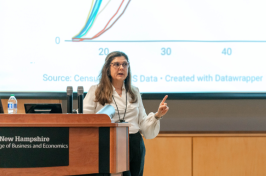
Computer information systems graduate Colby Johnson ’14 has been named director of development at CommonPlaces Interactive, a digital agency specializing in B2B and nonprofit custom web experiences in Manchester.
A New Hampshire native, Johnson came to the University of New Hampshire’s Manchester campus after graduating from Manchester Memorial High School in 2009. He worked as a tech consultant for UNH and as an information technology specialist for the New Hampshire Army National Guard while he was attending college.
During his senior year at UNH Manchester, Johnson was on the software design team that helped develop a prototype to measure the water weight of snow loads on rooftops. The project was led by the Barrington engineering firm 2KR Systems LLC.
Since he started at CommonPlaces in 2014, Johnson has built a solid software infrastructure which includes a hosting platform that allows custom web application in different environments to run on the server and created an internal Knowledge Base called Zeus. He also implemented a state-of-the-art automated project management and customer support system to improve customer communication.
Johnson’s career is highlighted by his work on award-winning projects such as the Verizon Wireless App Challenge, California’s carbon footprint sustainability initiative Cool Block, Harvard College’s LASPAU and Cummins Diesel website consolidation project.
Johnson was promoted to Director of Development after three years of developing customized Drupal websites for CommonPlaces’ clients. In his new role, he will be working closely with all departments at CommonPlaces to make sure client's needs are communicated clearly and that projects run smoothly.
Johnson said he loves programming because it challenges him to think critically and creatively.
“I do lose sleep over some of it, but I like this job because it makes me think,” Johnson said. “I like to see what I am capable of, taking it all in and powering through.”
Interested in computing technology? Check out UNH Manchester's programs in Computer Information Systems or Computer Science.

















































